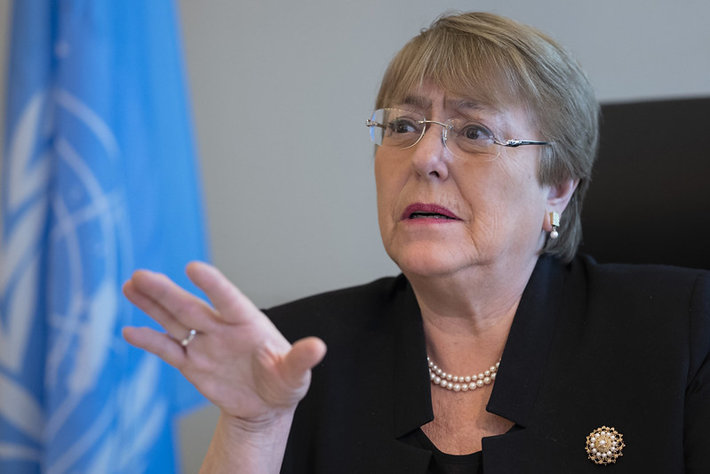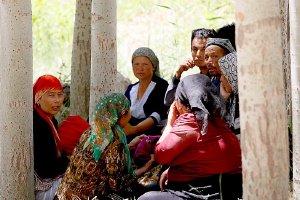A top UN official has accused China of committing “serious human rights violations” amounting to crimes against humanity in its Muslim-majority province of Xinjiang.

On August 31, minutes before her four-year term as UN High Commissioner for Human Rights ended, Michelle Bachelet issued a long-awaited report in which she said that the arbitrary detentions of members of Xinjiang’s Uyghur community and other Muslims “may constitute international crimes, in particular crimes against humanity.”
Bachelet released the report “despite Chinese efforts to delay or block it, aware of how it could validate claims that more than 1 million ethnic minority members were forcibly sent to centers it says were for vocational training,” Associated Press noted in a news analysis a day after the report was made public.
“Those who were held, their relatives and monitoring groups describe them as prison-like reeducation centers where inmates were forced to denounce Islam and their traditional culture, while swearing fidelity to the ruling Communist Party,” the article said.
“The camps have been part of a widespread campaign of repression in Xinjiang, allegedly including involuntary sterilizations of women, forced labor, the demolition of mosques and other religious sites, the separation of Muslim children from their families, and the harassment of minority members living abroad.”
Waging what they describe as a war on terror, religious extremism, and separatism, Chinese authorities are rounding up and housing Uyghurs in so-called reeducation camps known as Vocational Educational and Training Centres (VETCs), the 48-page UN report noted.
In fact, however, Chinese authorities have incarcerated up to 1.8 million Muslim citizens in the Xinjiang Uyghur Autonomous Region in more than 1,300 concentration-style camps, according to the U.S. Commission on International Religious Freedom (USCIRF), a bipartisan, independent U.S. federal government watchdog.
On January 19, 2021, his last day as U.S. Secretary of State, Mike Pompeo condemned Beijing for what he said were genocidal crimes against humanity in Xinjiang. Pompeo’s successor, Antony Blinken, has endorsed his denunciation.
Xinjiang is China’s largest region, covering one-sixth of the country’s territory, and among its poorest. Dating back to 2017, the Chinese government’s arbitrary detentions and human rights abuses “come against the backdrop of broader discrimination” against Uyghur and other minorities, Bachelet said.
In 2018, with the introduction of reeducation camps in Xinjiang, the UN report said it uncovered a “dramatic” increase in cases pertaining to the enforced or involuntary disappearance of people from the region.
Since then, numerous research and investigative reports published by nongovernmental organizations, think tanks and the media, in addition to victims’ accounts, have alleged “arbitrary detention on a broad scale … as well as claims of torture and other ill-treatment, including sexual violence, and forced labor,” the UN report said.
Even if the reeducation camps there have been “reduced in scope or wound up,” Bachelet said in her report, “the laws and policies that underpin it remain in place,” resulting in increased imprisonment and “interlocking patterns of severe and undue restrictions on a wide range of human rights.”
China has issued a 131-page rebuttal of the UN report in which it vigorously denies committing any abuses in Xinjiang.
But China has long denied allegations it is persecuting Uyghurs and other minority groups for their faith and way of life. What’s more, Chinese authorities have argued that “camp attendance was voluntary and no human rights were abused,” despite the fact that internal Chinese documents have frequently contradicted such claims, the Associated Press analysis observed.
_______________
From its beginnings, the Church of Scientology has recognized that freedom of religion is a fundamental human right. In a world where conflicts are often traceable to intolerance of others’ religious beliefs and practices, the Church has, for more than 50 years, made the preservation of religious liberty an overriding concern.
The Church publishes this blog to help create a better understanding of the freedom of religion and belief and provide news on religious freedom and issues affecting this freedom around the world.
The Founder of the Scientology religion is L. Ron Hubbard and Mr. David Miscavige is the religion’s ecclesiastical leader.
For more information visit the Scientology website or Scientology Network.


